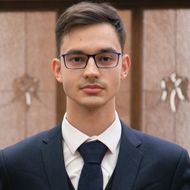
Of the 18 students who presented their thesis studies, 3 received the maximum score (10) and 7 excellent scores (8 and 9). This year’s class’s theses deal with topics as diverse as cryptocurrency markets, pension schemes, gender impact on financial transactions, and even climate trade and carbon futures pricing.
The authors of the top-scoring master’s theses are as follows:
Thesis title: The Financial Factors of the Timing of Retirement Before and After the COVID-19
Supervisor: Prof. Elena Kotyrlo, HSE Faculty of Economic Sciences.
Thesis title: Regulator's Dilemma: Short Selling Ban vs Capital Requirements under Basel III
Supervisor: Sofya Budanova, Associate Professor, HSE ICEF.
Thesis title: Various Measures of Informed Trading. Application to the Cryptocurrency Markets
Supervisor: Professor Alexey Boulatov, HSE ICEF.
Other topics that have been covered brilliantly in the master’s theses include:
- Distribution of Income and Physical Shape within Russian Family Couples;
- The Determinants of Carbon Emissions Futures Prices;
- The Impact of Board Gender Diversity on the Long-Term M&A Performance. Analysis of US Market;
- The Effect of Imposed Sanctions in 2014 on Capital Structure of Russian Firms.
Alexey Kipriyanov

My master’s thesis is entitled Regulator’s Dilemma: Short Selling Ban vs Capital Requirements under Basel III and it follows up on the research work that I started in the first year of my master’s study. I think there were two reasons why I chose this topic, the first being the opportunity to gain a deeper insight into the phenomena I had been studying earlier, and the second reason being that my topic has been covered in scientific literature only poorly. This latter point added novelty and complexity. The level of scientific novelty displayed in my study wasn’t the last thing that earned me the top score.
Next
I have been doing studies under the guidance of my supervisor Sofia Budanova for three years now. Professor Budanova was the supervisor also for my bachelor’s thesis. In the course of these three years, she taught me how to produce high-quality econometric studies and present results in a way understandable to a wide range of audiences. This is a very important skill – more so in the contexts where processes are run by artificial intelligence.
My plan after earning my master’s is to pursue the academic path in parallel to my current job at the Credit Bank of Moscow’s Treasury. I will continue to teach courses to ICEF’s undergraduates and will start teaching Financial Econometrics to master’s students. As to my economics research, I am planning to go on with it as a student of HSE graduate school.
Kamilla Bakhtieva

Like many of my classmates, I chose the topic for my thesis from the list proposed by our research supervisors. It seemed logical to pick the one I already had the experience with and liked most, so finally I chose to do a microeconomic study, which involved the empirical data from RLMS (The Russia Longitudinal Monitoring Survey, a series of nationally representative surveys). I am familiar with it from the first year of my master’s study.
One thing that helped me write a winning thesis was the research seminars conducted by my supervisor, where we regularly looked at the structural composition of course papers and theses, as well as the empirical methods they involved. I did a lot of reading on my chosen topic and have benefitted greatly from my previous experience of writing studies over the course of six years as an HSE student.
Next
I would seek advice from my supervisor on nearly every aspect of my thesis, from academic literature search to best-fit econometric methods to data processing. Her most valuable contribution was the advice concerning the empirical part of my research: I was totally new to the model that I chose to use in the study, nor had it been covered in any of the econometrics courses that I did as part of my undergraduate and graduate study.
Summing up my years at ICEF, I can say that they provided me with the profound knowledge of macro- and microeconomics, econometrics and financial economics. Thanks to the wide range of electives, I learned a huge amount of skills in the areas of financial modeling, private equity, banking, and more. As to my master’s study, it has given me sufficient understanding of the majority of processes and phenomena occurring in the global economy. The knowledge that I gained of corporate economy, state economic policies, and workings of financial markets will surely come in handy in my future job, serving as a foundation for my path to becoming an accomplished expert. My plan for now is to gain experience in banking. I don’t think I’m going to apply for PhD any time soon. I believe one needs to first get practical experience so as to identify what they’d like to explore scientifically as graduate students and maybe even try to bring fresh wind. But, I’ll stay in academia in the role of a teacher – next year I’ll be teaching Financial Economics and Econometrics seminars to ICEF students.
Grigory Kuzmin

I have been studying the market microstructure for about four years now and wrote my first study in my third year. My thesis is, in fact, the result of the many-year research on my chosen topic, which explains why it scored the highest. It explores the informed trading models and uses cryptocurrencies as an example of a relatively new financial asset to apply the mathematical models to. My focus is more on modeling methodologies. I propose some novel measures and approaches to interpreting the long established concepts. While many academics seem to be quite skeptical about cryptocurrency as topic for the graduation theses, I wouldn’t callit a “trend” or “hype”. I see cryptocurrencies as another newly emerged financial instrument and a medium to test the known financial models on, just the way they are applied to trading strategies and market regulation.
Next
My thesis supervisor is Professor Alexey Boulatov. He has been my academic mentor since Y3. It is thanks to Prof. Boulatov that I developed a strong interest in financial mathematics and started to explore the issues I take keen interest in. Our cooperation has taught me self-reliance and ability to get to the core when dealing with the concepts I don’t have enough experience with. The role of a research supervisor is primarily to guide and prompt on the course for the study to take, while everything pertaining to practical tasks and intermediate solution finding is solely your responsibility. Alexey Boulatov urges you to learn independently. You can’t approach him with something like, “I’m not sure l know how to do it”. Instead, you are expected to ask questions and provide possible solutions for him to help you choose the best-fit one or prompt where you went wrong. An approach like this cultivates in learners independence. For me, learning a new skill or navigating a new field is no longer a problem.
At some point I found it difficult to decide between academia and industry. Somehow, after interning with the Laboratory of Financial Economics and teaching Finance Theory and Econometrics to undergrads in the final year of my master’s study, my heart was in the industry. I like doing research and how it enriches me and urges to learn more, but I think I’ll go into the industry. I know there are careers in the finance sector which offer ample room for research while allowing multiple opportunities for growth or track change.
I really enjoyed studying for my master’s. My initial thinking was, “It’s going to be easy now that I did bachelor’s. What more can they teach me?” I was wrong. At ICEF, master’s courses are as profound as those taught at PhD level, and they are being constantly updated to reflect scientific trends. My next step is to earn a PhD in Economics here at HSE, and in the meantime I am looking for a job. Also, I am working to get my master’s research published and I hope I will continue teaching classes to the ICEF undergrads.



